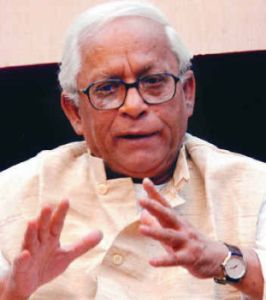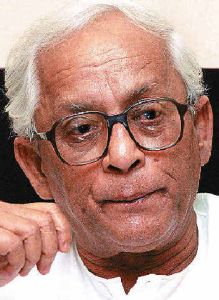It’s Buddhadeb Bhattacharjee and not Prakash Karat, who should be held accountable for the Left debacle in West Bengal ~ argues Bappaditya Paul

Introspection. That’s what the Left leaders, especially those in the CPI-M, are now pitching for after the Left’s electoral debacle in West Bengal and Kerala. While Kerala has this tendency of alternately voting in and out the Left, the performance in West Bengal this General Elections is certainly a disaster.
After 32 years of being in power, the Left tally in West Bengal has now been reduced to only 15 Lok Sabha seats, whereas the Congress-Trinamul Opposition combine has occupied 26. In terms of geographical consideration, the Left has lost its bastions in ten out of the 19 districts in West Bengal.
As regards the CPI-M, the leading Left party has begged only nine seats. This is CPI-M’s worst ever Lok Sabha poll performance in WB in the last three decades, since the party had started off with five MPs in 1967.
The obvious question now is, who should be held accountable for this disaster? The popular argument that has been instigated by an indirect remark by the ousted CPI-M leader Mr Somnath Chatterjee is that, Mr Prakash Karat should be held responsible for the poll debacle and be removed as the party general secretary.

This argument is based on the reasoning that, had not Karat pulled out support from the UPA-I government at Centre, there was remote possibility of a Congress-Trinamul tie up in West Bengal and thus, the Left could have easily avoided an united assault by the Opposition.
But those who are pitching for Karat’s removal should be ashamed of the very fact that after savouring power for long 32-years, they now have to rely more on a divided Opposition than their own support base.
This points at the Left Front government’s bankruptcy, which has largely been the contribution of Mr Buddhadeb Bhattacharjee during his chief ministership in the past eight years.
Buddadeb has proved to be a failure both as an administrator and a politician ~ take the examples of the Rizwanur death case, the Nandigram massacre, the Dinhata firing or the Darjeeling tangle.
One can justifiably ask, why Buddadeb had to defend the Kolkata Police commissioner Mr Prasun Mukherjee and his coterie of senior police officials, till the court compelled the state government to remove the sleuths for wrongfully meddling into the Rizwanur Reham-Priyanka Todi affair, leading to the former’s mysterious demise?

After the infamous Nandigram Massacre of 14 March 2007, Buddhadeb apologised several times in public saying, he would not have given the police a marching order, if he could sense that the police would go on a shooting spree.
Given his statement, are we to believe that without assessing the level of possible resistance and a detailed assault plan, the police went on for the massive troop buildup at Nandigram in the run up to the massacre? That too, without the knowledge of the chief minister, who is also in-charge of the state Home ministry?
That, the magistrate or senior police officials who were leading the 14 March foray into Nandigram, did not contact the Writers’, especially the chief minister, before triggering the bullets?
No sensible person would buy this story.
The truth is, in Nandigram the ruling Communists were losing out their political ground to the Opposition and thus, political considerations overlapped Buddhadeb’s administrative reasoning and he ended up facilitating the massacre.

On the other hand, when it came to the Dinhata firing on members of the Forward Bloc or the impromptu rise of Mr Bimal Gurung in Darjeeling; Buddhadeb unwisely relied only on an administrative approach.
In case of Dinhata, Forward Bloc had beforehand made public announcements about its proposed march on 5 February 2008 over the demand for a full-fledged ministry for north Bengal’s development. But in reality, it was a show of strength by the Cooch Behar FB leader Mr Udayan Guha, whom the CPI-M was paying no heed since his defeat in the 2006 WB Assembly poll.
Had Buddhadeb been a sensible politician, utilising both his administrative and political machinery, he would have reached out to Guha before the march and convinced him to keep the agitation pitch lower so to avoid any confrontation with the police.
But here came his CPI-M ego and he treated the FB march only from an administrative point of view, ending up killing five FB activists in police firing.
With this Buddhadeb earned the rare ‘credit’ of blotting the three decades’ of Left Front rule in West Bengal: first, his police killed the common people at Nandigram and then, showered bullets on the chest of Front ally FB at Dinhata.
Yet, he gleefully continued as the chief minister and did not even bother to relinquish the Home ministry portfolio.

Then came Darjeeling, where a novice politician, Bimal Gurung, rose from nowhere to denounce the proposed Sixth Schedule status for the Hills and stoked up the second bout Gorkhaland statehood movement.
In late 2007, Gurung had only began raising his head and was garnering public support for Gorkhaland through mass gatherings.
On 9 December 2007, one such meeting was organised at the Sukna playground on the outskirts of Siliguri and Gurung himself was present on the dais waiting for his turn to speak. But all of a sudden, Gurung received a call on his mobile and climbed down the stage while hanging on to the call and then left the meeting venue abruptly.
Later, his party’s Press and publicity secretary, Mr Binay Tamang, requested journalists not to publish/show Gurung’s name/images as being present at the gathering.
Reportedly, it was the then Darjeeling superintend of police, Mr Rajesh Subarna, who had called up Gurung and warned him that he would be arrested under pending criminal cases, if found appearing in public meetings.
Till then, the fear for the administration was visibly so deep in Gurung’s psyche, that he had left the Sukna meeting venue instantly.

Given that till then, Gurung had not been able to consolidate his support base; the CPI-M could have easily gone for a political offensive in the Hills. But Buddhadev, who was in charge of the Darjeeling Hills both in his party and in the state government, decided otherwise. He turned the CPI-M and the administration into mute spectators even as Gurung grew from strength to strength.
The rest of the story is known to everybody ~ Gurung now controls the Sunrise at Tiger Hill, well almost!
In the light of such track record, would it be too harsh to conclude that both as the chief minister and as a political leader, Buddhadeb Bhattacharjee has become a burden for the CPI-M in West Bengal?
Buddhadeb and his coterie ~ that exists from the south to northern districts of Bengal, must be shown the doors at once; thus kick-starting a rectification drive for repairing the devastated Red citadel in the state brick by brick.
(The author is on the staff of The Statesman/India)
